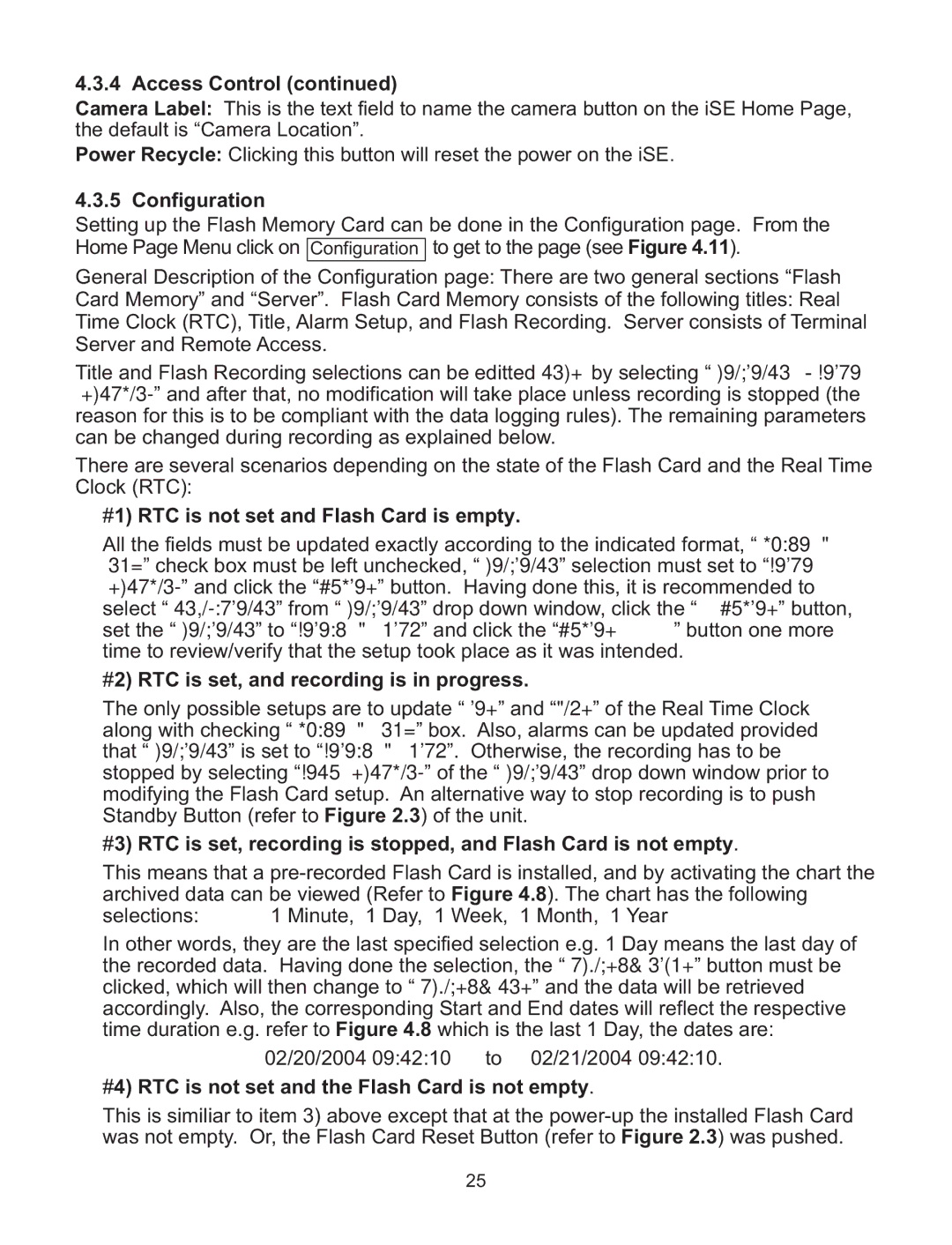4.3.4 Access Control (continued)
Camera Label: This is the text field to name the camera button on the iSE Home Page, the default is “Camera Location”.
Power Recycle: Clicking this button will reset the power on the iSE.
4.3.5 Configuration |
|
| |
Setting up the Flash Memory Card can be done in the Configuration page. From the | |||
Home Page Menu click on Configuration to get to the page (see Figure 4.11). | |||
General Description of the Configuration page: There are two general sections “Flash | |||
Card Memory” and “Server”. Flash Card Memory consists of the following titles: Real | |||
Time Clock (RTC), Title, Alarm Setup, and Flash Recording. Server consists of Terminal | |||
Server and Remote Access. |
|
| |
Title and Flash Recording selections can be editted once by selecting “Activation - Start | |||
Recording” and after that, no modification will take place unless recording is stopped (the | |||
reason for this is to be compliant with the data logging rules). The remaining parameters | |||
can be changed during recording as explained below. | |||
There are several scenarios depending on the state of the Flash Card and the Real Time | |||
Clock (RTC): |
|
|
|
#1) RTC is not set and Flash Card is empty. | |||
All the fields must be updated exactly according to the indicated format, “Adjust RTC | |||
Only” check box must be left unchecked, “Activation” selection must set to “Start | |||
Recording” and click the “Update” button. Having done this, it is recommended to | |||
select “Configuration” from “Activation” drop down window, click the “Update” button, | |||
set the “Activation” to “Status/RTC/Alarm” and click the “Update” button one more | |||
time to review/verify that the setup took place as it was intended. | |||
#2) RTC is set, and recording is in progress. | |||
The only possible setups are to update “Date” and “Time” of the Real Time Clock | |||
along with checking “Adjust RTC Only” box. Also, alarms can be updated provided | |||
that “Activation” is set to “Status/RTC/Alarm”. Otherwise, the recording has to be | |||
stopped by selecting “Stop Recording” of the “Activation” drop down window prior to | |||
modifying the Flash Card setup. An alternative way to stop recording is to push | |||
Standby Button (refer to Figure 2.3) of the unit. | |||
#3) RTC is set, recording is stopped, and Flash Card is not empty. | |||
This means that a | |||
archived data can be viewed (Refer to Figure 4.8). The chart has the following | |||
selections: | 1 Minute, 1 Day, 1 Week, | 1 Month, 1 Year | |
In other words, they are the last specified selection e.g. 1 Day means the last day of | |||
the recorded data. Having done the selection, the “Archives_Enable” button must be | |||
clicked, which will then change to “Archives_Done” and the data will be retrieved | |||
accordingly. Also, the corresponding Start and End dates will reflect the respective | |||
time duration e.g. refer to Figure 4.8 which is the last 1 Day, the dates are: | |||
| 02/20/2004 09:42:10 | to | 02/21/2004 09:42:10. |
#4) RTC is not set and the Flash Card is not empty.
This is similiar to item 3) above except that at the
25
